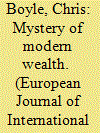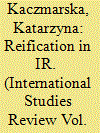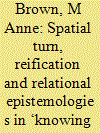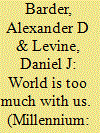|
|
|
Sort Order |
|
|
|
Items / Page
|
|
|
|
|
|
|
| Srl | Item |
| 1 |
ID:
083741


|
|
|
|
|
| Publication |
2008.
|
| Summary/Abstract |
Taking its cue from Jacob Viner's classic essay `Power versus Plenty', this article explores the social foundations of one of International Relations' basic analytic categories: `wealth'. An examination of changing notions of economic value in the early-modern period suggests that Viner's assessment of the unenlightened attitudes of mercantilist statesmen needs revision. The rise of a liberal world order presupposes not just a clearer understanding of the nature of value, and how best to obtain it, but a fundamental transformation in the character of value itself - from an attribute of metallic money alone, to an abstract economic property of all human labour. In accounting for this shift we reveal an underlying structure of social relations whose development lies at the root of both our modern notion of value and of the liberal international economy itself.
|
|
|
|
|
|
|
|
|
|
|
|
|
|
|
|
| 2 |
ID:
168397


|
|
|
|
|
| Summary/Abstract |
This article studies the contentious problem of reification in international relations (IR) on the example of the idea of international society. It shows how the idea became reified, that is, how the move was made from approaching international society as one of several competing frameworks for the study of international politics to considering it an objective fact, a self-evident reality of international politics, and an entity in the possession of agency. For this purpose, I trace key writings of the English school and survey their contribution to the idea’s development and gradual reification. I posit that reification has been the outcome of individual strategies and disciplinary practices pertaining to the knowledge production process, in particular the perceived need to establish and maintain a research program while continuing to provide viable explanations of world events. In discussing the consequences, I argue that reification adversely affects not only research outcomes but also the study process. A reified category, once it becomes a default language through which to think and talk about international politics, narrows down avenues for diverging interpretations of international politics. Furthermore, endowing international society with agency hides real agents behind specific actions in international politics.
|
|
|
|
|
|
|
|
|
|
|
|
|
|
|
|
| 3 |
ID:
175359


|
|
|
|
|
| Summary/Abstract |
How we approach knowing conflict and security makes a difference. This article first considers how reification, instrumental subject/object relations and the drive for certainty and control undermine effective knowledge and practice in questions of conflict and peace. It then turns to what the spatial turn and notions of emplaced security might offer to working against violence. As with any theoretical perspective, the spatial turn can itself be reified, repeating epistemological relations entrenched in much security analysis. The spatial turn and emplaced security explicitly highlight alternative, more relational knowledge practices, however. A relational epistemology approaches knowledge not only as information about a subject out there, but also as a form of practice with others which changes conditions of possibility for co-existence. If pursued, such approaches could help loosen the grip of narrow constructions of security, insecurity, the person, power and agency which dominate security analysis and obstruct understanding and the generation of alternatives in situations of entrenched conflict. An orientation to place could not only enable more nuanced accounts of peace and conflict, but support mutual recognition and exchange across division, assisting an ethic of attention and concrete peace and conflict resolution efforts.
|
|
|
|
|
|
|
|
|
|
|
|
|
|
|
|
| 4 |
ID:
113854


|
|
|
|
|
| Publication |
2012.
|
| Summary/Abstract |
International Relations' constructivist turn - that body of approaches emerging in the late 1980s/early 1990s in which international outcomes were held to be predicated upon complex social arrangements, rules, norms, institutions, language and culture - emerged from a unique historical and intellectual moment. Initially, this theoretical turn was deeply committed to reflexivity and circumspection: since events were held to be contingent and theorists were bound up in them, the obligation to sustained critical self-reflection was central to the project. That commitment would not last, however. By the mid-1990s, it had given way to a 'middle ground' (or via media) position, which aligned itself with dominant materialist and rationalist methodologies and epistemologies. We wish to examine that moment of realignment: how it happened, and what it might mean. We argue that having imbibed a degree of the free-floating optimism that was 'in the air' in the 1990s, via media constructivism's leading scholars came to believe that it was no longer necessary to problematise the historicity and contingency of their own historical moment and philosophical horizons. The post-Cold War 'world', we hold - or, at any rate, one account of it - was 'too much with' via media constructivism: selectively constraining its reflexive impulses and critical tools in ways that, however unintentionally, provided cover for particular normative and ideological configurations. To move past this, we argue that via media constructivists need a sustainably critical ethos: one which 'repoliticises' international theory by unmasking its hidden ideological and political starting points.
|
|
|
|
|
|
|
|
|
|
|
|
|
|
|
|
|
|
|
|
|